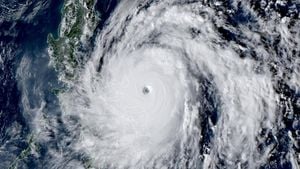The COP29 climate summit is underway, and its timely arrival finds global leaders, diplomats, and activists grappling with the pressing realities of climate change and its political ramifications. This year’s summit, hosted by Azerbaijan from November 11 to 22, is marked by heightened urgency, not only due to the worsening state of the planet but also due to Donald Trump’s potential return to the presidency. His past reign has left a notable influence on climate policies, and many worry it can undo significant progress made on global climate change efforts.
With climate catastrophes looming larger than ever, the urgency for action is palpable. This year, the World Meteorological Organization (WMO) warned we are likely to witness unprecedented heat as 2024 is expected to outstrip previous records for global temperatures. Wildfires have consumed vast areas, and floods ravaged multiple regions across Europe and Asia, demonstrating the relentless grip of climate change.
Yet, as the summit gathers momentum, the specter of Trump’s presidency hangs heavy over proceedings. During his previous term, Trump had vowed to pull the U.S. out of the Paris Agreement, which seeks to curtail greenhouse gas emissions and limit global warming to below 1.5 degrees Celsius. His election could herald another withdrawal, leaving many countries — especially those vulnerable to the effects of climate change — feeling anxious and demoralized.
"At COP29, Africa needs leaders who recognize climate finance not as charity but as responsibility rooted in historic accountability," remarked Dean Bhekumuzi Bhebhe from Power Shift Africa. It is precisely during summits like these where rich nations are expected to demonstrate their commitment to assisting developing counterparts grapple with climate impacts. The sheer scale of funding required — estimated at over $2 trillion — proves the enormity of the task before the world's leaders.
Interestingly, tensions at COP29 have been exacerbated by the unexpectedly aggressive stance of new political figures. For example, President Javier Milei of Argentina, who aligns with Trump on several issues, has already hinted at potential roadblocks to global agreements on taxation and climate initiatives, raising alarms among negotiators about his influence.
"The Argentine government wants to make the G20 in Brazil a test between old and new forces," observed one Brazilian official. Milei is not only opposing references to the Paris Agreement but has also withdrawn his negotiators from COP29, reflecting his climate-skeptic tendencies. This withdrawal has led to concerns among diplomats who fear it may embolden other conservative leaders, risking the rollback of prior commitments made by wealthier nations.
Within COP29 discussions lies the fundamental need for financial commitments from rich countries with historical emissions. One of the brighter spots is the presence of smaller nations, which continue to press the importance of these negotiations. Although many high-profile leaders have opted out of this year’s summit — among them, U.S. President Biden — smaller yet equally significant delegations from island nations and African states have stepped up to advocate for their interests and insist on necessary action against climate change.
Climate activists have voiced their frustrations, echoing sentiments seen throughout the business community. They argue any future U.S. commitment to emissions reductions could be futile should Trump's administration reverse it. Ben Goloff, from the Center for Biological Diversity’s Climate Law Institute, underscored this saying, "Climate diplomacy does not stop for one leader's apparent disregard for science. We must act beyond the politics of the moment."
The urgency surrounding climate talks intensifies with reports highlighting Trump's previous disregard for environmental issues, having labeled climate change as "a hoax" during his first campaign. His return could dramatically shift the discussions at COP29, redirecting focus away from climate commitments and toward fossil fuel production and deregulation.
The sad irony is evident. The United States — the second-largest emitter globally — needs to lead by example and provide substantial funding for developing nations. The deficit is glaring, as many nations, particularly those on the frontline of climate impacts, rely on sophisticated climate financing to cope and adapt.
Rose Omariba of the Laudato Si Movement Kenya expressed concern over the potential ramifications: "Many leaders didn’t even attend this year. The U.S. influence casts doubts over countries fully committing to their philosophies for climate finance. Should the U.S. step back under Trump, it can shift the entire dynamic of negotiations."
Also, as COP29 progresses, delegates must navigate through the fractures created by various national policies, especially highlighting Milei's reluctance to sign off on previous commitments. His government’s opposition to specific G20 communique drafts raises fears of splitting alliances and firms up the perception of diminishing collaboration amid growing tensions.
Compounded by disagreements on finances and how much developing nations should contribute, the path to securing unanimous agreements appears fraught with challenges. The necessity of cohesive agreements—such as reestablishing the Green Climate Fund for developing nations—is more pressing than ever.
The commanding call for change persists amid fears of Trump’s infrastructural policies returning to prominence once more. This COP conference happens at a consequential moment for the world, particularly for the capacities of smaller states to secure their places on the global climate agenda against the backdrop of economic and ecological challenges.
Beyond just the environmental outcome of COP29, success depends upon fostering international collaboration between nations willing to confront their responsibilities toward climate change. With the expected elections and political transitions, it remains uncertain if discussions happening now might withstand future leadership changes.
The generations facing the brunt of climate change are becoming more vocal, emphasizing their right to not just survive but to thrive. Their messaging is increasingly calling for accountability, recognizing the urgency of addressing climate challenges. They need champions who will advocate for real action at scales never seen before.
With deadlines approaching to finalize draft decisions and commitments, both domestic and foreign leadership will be put to the test. These COP29 negotiations serve as both a bellwether and crucible for climate leaders worldwide. The failure or success of this summit could well resonate through future generations, shaping the world we leave for them.



